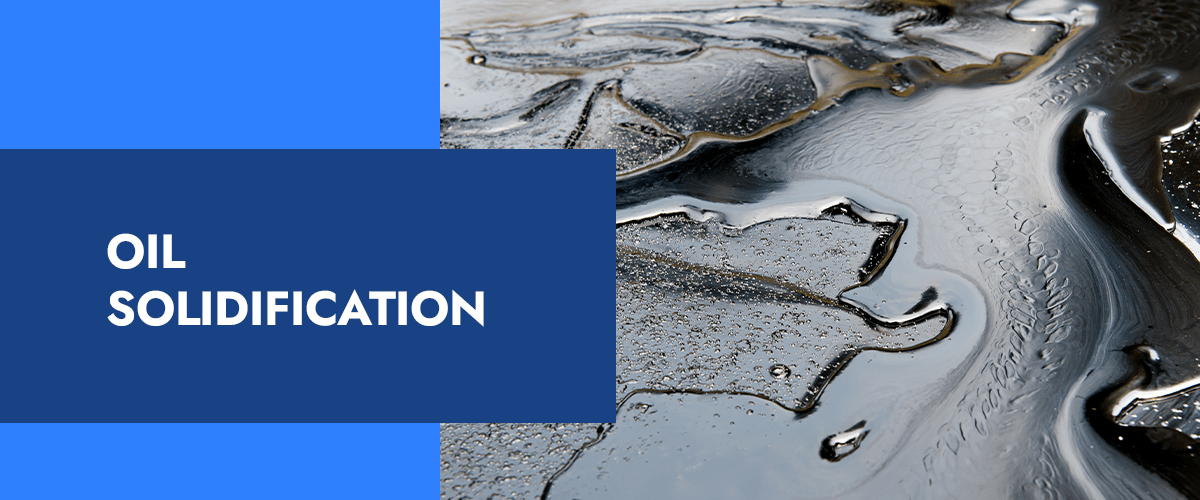
Numerous oils are integral to the products and services we rely on each day. From gasoline and diesel fuel to animal fats and vegetable oils, consistently high use translates to extensive storage and transport volumes daily.
Unfortunately, these same essential materials can be detrimental to the environment, drinking water and other natural resources — and even the economy when spills occur. Prompt reaction and removal are crucial to protect public health and ecology, spurring solidifier use as an oil spill containment and removal solution.
Contact Us
What Is an Oil Solidifier?
An oil solidifier is a polymer-based substance with dry and high-molecular-weight characteristics. These polymers typically share a permeable matrix construction and hydrophobic nature. In other words, oil solidifiers attract oil and repel water.
Typical forms include:
- Powders and granules.
- Cakes, sponges, balls and pucks.
- Contained polymers in pillows, booms, pads and socks.
The solidified substance can range from a firm cohesive solid to a more granular state, simplifying its removal from water.
Under the Environmental Protection Agency (EPA) guidelines, allowable solidifiers must meet specific criteria for use, like:
- Water insolubility.
- Inclusion of fewer than 5 parts per million of chlorinated hydrocarbons or heavy metals.
- A polymer-concentrated formulation with few additives.
- A gravity of less than 1.0.
- The ability to stimulate a physical, leaching-resistant reaction to absorb oil.
- The ability to contain the solidified media under pressure.
- Material nontoxicity to humankind, flora and fauna.
How Do Oil Solidifiers Work?
Oil solidifiers provoke a physical reaction with varying time frames and levels of effectiveness based on oil type.
The Physical Process
In technical terms, solidifiers work with the support of van der Waals forces, where hydrocarbon polymers attract petroleum hydrocarbons because of a similar physical structure. Once introduced, the solidifiers physically bond with the oil molecules, seemingly without a chemical reaction.
The resulting bond increases the oil’s viscosity, or thickness, eventually turning it into a more solid form.
Solidification Time Frames
Solidification times can range from less than a minute to up to an hour for quick-acting products, with some continuing to work for over 60 minutes. Quick-acting agents may be ideal for forming a containment barrier before deploying other removal methods. Conversely, longer time frames may be better for complete removal since they prevent a possible result of solidified and unsolidified oils by reacting a bit more slowly.
The solidifier’s surface area is the primary determinant of solidification time. For example, powders often produce faster results than granules because their fine-grained nature allows them to cover higher surface areas quickly.
Ideal Oil Characteristics
Solidifiers perform better with lightweight or moderate-viscosity oils than heavier, thicker ones. The latter takes longer to solidify and may produce less effective results. With volatile oils like gasoline, evaporation continues slowly.
You should evaluate the oil’s properties during a spill to identify the accurate application rate.
Advantages of Oil Solidifiers
Oil solidifiers have numerous advantages for oil spill cleanup, including:
- Potential reclamation: The resulting solidified substance may be recyclable if it passes appropriate federal and state testing.
- Low-temperature use: Solidifiers perform sufficiently in cold extremes, making them suitable for frozen solid surfaces or in icy waters.
- Visual monitoring: Solidifiers like Oil Bond® allow for straightforward visual monitoring during both use and testing.
- Affordability: Conventional cleanup methods like skimmers and vacuum tankers are costly and involve more manual labor or water transport.
- Speed: Solidifiers work faster than traditional vacuuming and skimming approaches.
- Eco-friendliness: Solidifiers are kinder to the environment and its residents because they meet the EPA’s nontoxic requirement.
In addition, solidifiers have several advantages over traditional oil absorbents, such as:
- Better effectiveness on light oils and sheens: Conventional sorbents find thinner oil spreads and slicks challenging to clean. Oil solidifiers generally produce better results in these scenarios.
- Increased versatility: Solidifiers are generally more effective on solid surfaces and can form a containment barrier.
- Less waste: When using solidifiers, the resulting waste is volume-proportionate. Traditional sorbents generate larger waste amounts.
- Testing success: Unlike sorbents, solidifiers have a higher likelihood of passing leaching tests for landfills.
Contact Us
Solidification Products International, Inc. Oil Bond®
Simplify oil spill cleanup with our patented SPI Oil Bond® solidifier using particulates conforming to the EPA’s National Contingency Plan Schedule.
Performance
Oil Bond is ideal for application on liquid and solid surfaces alike. Our proprietary polymer-based solidifier swiftly turns hydrocarbons into solid masses for easy removal, leaving behind clean water. You’ll know it’s working as its color darkens during the physical bonding process.
Masses are typically removable in one pass when solidifiers remain in place for longer. You’ll generally need to take out smaller pieces if you need faster removal. Our complementary products can help remove any residual sheen when time is of the essence.
Availability
The Oil Bond granules come in convenient 10-pound pails and 40-pound bags. Additional products in the Oil Bond lineup include:
- Oil Bond spill kits: We customize each kit according to size, with three different sizes available.
- Oil Bond booms: You can choose from 2.5-inch diameters with 10-inch and 4-foot lengths, 5-inch diameters in 6-, 10- and 20-inch lengths, or custom sizes made to order.
- Oil Bond pillows: Our oil bond pillows come in standard sizing and can be stacked for maximum protection.
Choose SPI for Your Oil Solidification Solutions
Solidification Products International, Inc. has dedicated over 30 years to supporting oil spill containment and cleanup efforts for various industries. Our veteran-owned company’s commitment to technology, innovation and product expertise has made us a trusted source for a range of patented solutions.
Learn more or get a free personalized quote by contacting an SPI team member online.




